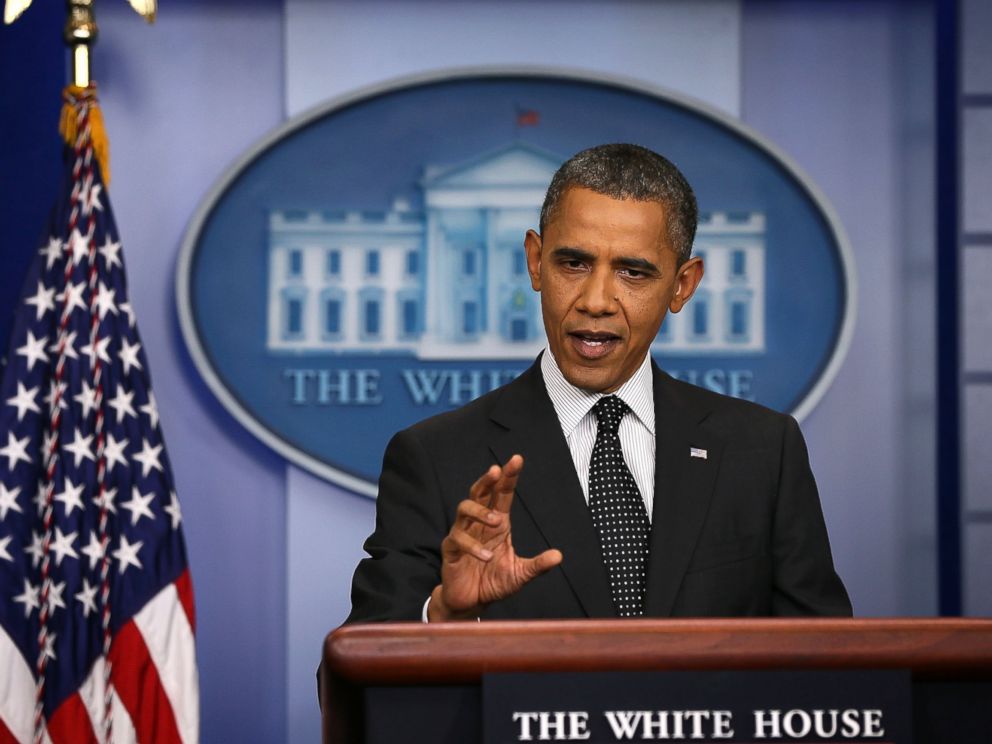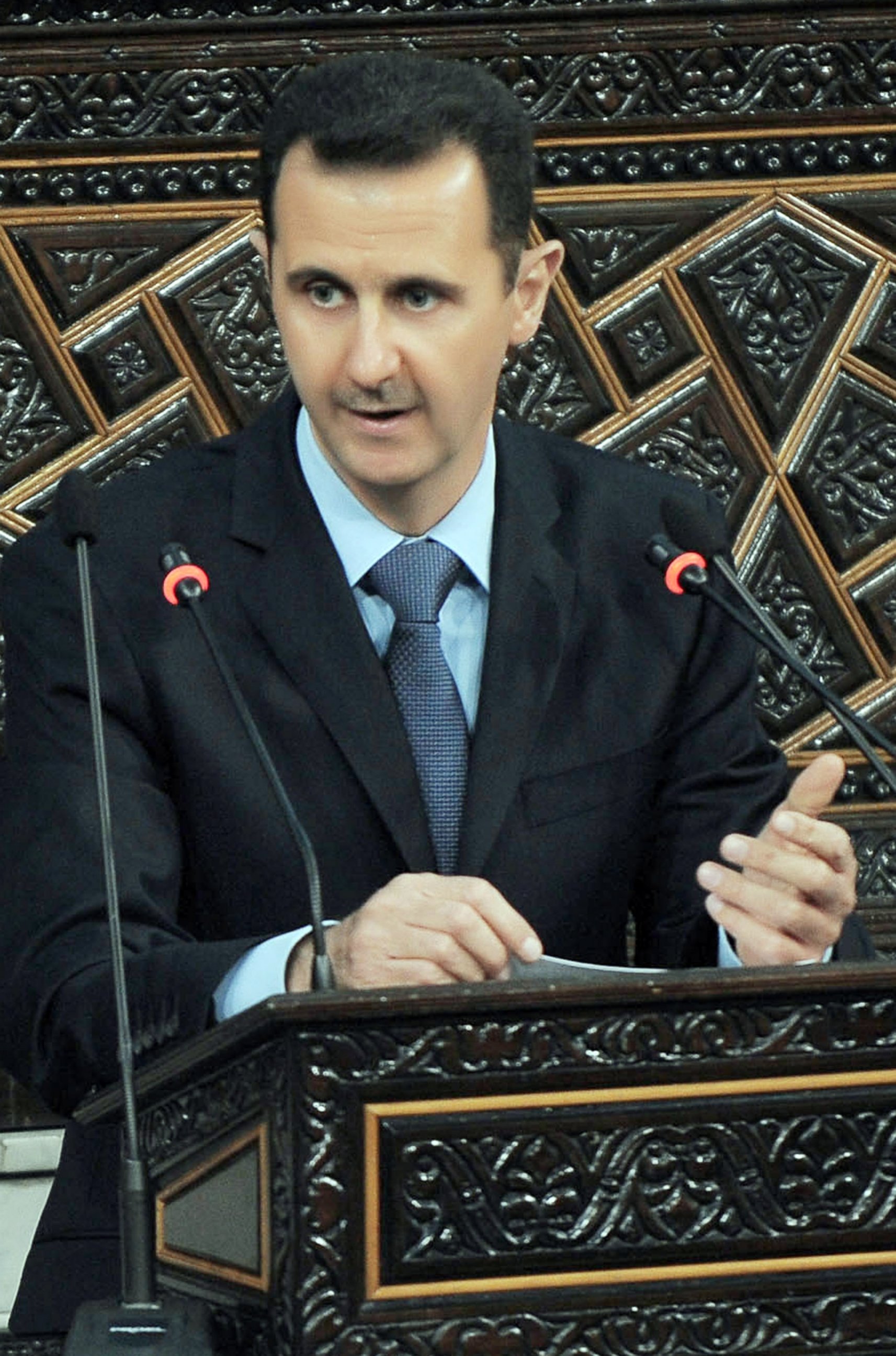Timeline leading up to US attack on a Syrian air base
President Trump ordered the strike Thursday night.
— -- President Trump's decision to conduct airstrikes against a Syrian air base marked a milestone for both the United States and the new administration.
While the airstrike is among the first military actions taken by Trump, the conflict in Syria has been going on for years.
The Syrian civil war started after President Bashar al-Assad cracked down on Arab Spring uprisings in his country in 2011.
Former U.S. President Barack Obama called on Assad to resign in 2011, the first significant condemnation by the U.S. of the Syrian regime in what would become an ongoing spate of criticism.
One statement by Obama that followed him throughout his administration's dealing with the Syrian conflict came in August 2012 when he said “a red line for us is we start seeing a whole bunch of chemical weapons moving around or being utilized.”

An apparent gas attack in March 2013 and then another chemical attack in August that same year were both attributed by the Obama administration to the Syrian government. Hundreds of people suffocated to death from the August attack, which United Nations investigators determined came from ground-to-ground missiles loaded with sarin gas.
When Obama said at the time that he would seek approval from Congress to order strikes in response to the chemical attack, Donald Trump, then a real estate mogul and reality TV star, tweeted that Obama should not attack Syria, noting "there is no upside and tremendous downside."
What happened since 2013 and this week
The ongoing civil war in Syria has resulted in a continued deterioration in conditions there since 2013, with an estimated hundreds of thousands of people dead and many others fleeing the violence, contributing to the refugee crisis in the Middle East and Europe.
Once Trump began his run for president in 2015, he rarely spoke about the civil war in Syria or proposals for military action. Whenever he spoke about Syria, he generally focused on the fight against ISIS or concerns by some Republicans about allowing Syrian refugees into the U.S.
His view on the conflict appeared to change this week. Here is how the past several days have unfolded.
Thursday, March 30, and Friday, March 31
Trump administration officials made clear that removing Syrian President Assad from power was not a high priority, a shift from the Obama administration.
The president's U.N. ambassador, Nikki Haley, said on March 30 of Assad: "Do we think he's a hindrance? Yes. Are we going to sit there and focus on getting him out? No."
On Friday, March 31, White House press secretary Sean Spicer said the U.S. approach in Syria was being driven by a new "reality" and that Assad's future was up to the Syrian people.
"There is a political reality that we have to accept in terms of where we are right now," Spicer told reporters. "We had an opportunity and we need to focus on now defeating ISIS."
Tuesday, April 4
A Syrian town held by rebels against the Syrian president was attacked with what was later identified as sarin nerve gas. The death toll from the chemical attack in the town of Khan Sheikhoun grew over the next few days to at least 86 civilians, including an estimated 30 children and 20 women. It is believed to be the worst chemical attack in Syria since August 2013.
White House press secretary Sean Spicer revealed today that Trump was first informed about the attack during his daily briefing at 10:30 a.m. He released a statement that afternoon calling the attack "reprehensible" and declaring that the Syrian government was responsible. The president also went on the offensive against the Obama administration.
"These heinous actions by the Bashar al-Assad regime are a consequence of the past administration’s weakness and irresolution. President Obama said in 2012 that he would establish a 'red line' against the use of chemical weapons and then did nothing," Trump said in a White House statement. "The United States stands with our allies across the globe to condemn this intolerable attack."
Wednesday, April 5
Options for action by Trump and guidance were refined in a restricted National Security Council principals meeting on the morning of Wednesday April 5.
That morning, the president's U.N. ambassador, Nikki Haley, held up photos of victims of the attack at the United Nations and accused Russia of blocking action and closing its eyes to the "barbarity" of three previous chemical attacks by vetoing a U.N. Security Council resolution in late February that would have imposed sanctions on those responsible.
"The truth is that Assad, Russia, and Iran have no interest in peace," Haley said. "The illegitimate Syrian government, led by a man with no conscience, has committed untold atrocities against his people for six years."
She warned that if the Security Council fails to act, the Trump administration will take action in response to the chemical attacks in Syria that she said bear "all the hallmarks" of Assad's government.

Shortly after 1:00 p.m., Trump addressed the attacks in greater length during a joint press conference alongside Jordanian King Abdullah II during his visit to the White House.
"It crossed a lot of lines for me. When you kill innocent children, innocent babies, little babies, with a chemical gas that is so lethal — people were shocked to hear what gas it was — that crosses many, many lines, beyond a red line, many, many lines," the president said.
When a reporter noted that the president has seemed reluctant to get involved in the Syrian confict, Trump said, "I watched past administrations say we will attack at such and such a day at such and such an hour ... I'm not saying I'm doing anything one way or the other."
"I think the Obama administration had a responsibility to solve the crisis a long time ago. And when he didn't cross that line in making the threat, I think that set us back a long ways, not only in Syria but in many other parts of the world, because it was a blank threat. I think it was something that was not one of our better days as a country."
Trump added, "I now have responsibility, and I will have that responsibility and carry it very proudly."
At 3 p.m., the National Security Council principals committee meeting convened and Trump was briefed on options and asked questions intended to gather further information, Spicer said today.
Thursday, April 6
Trump traveled to Florida on Thursday afternoon where he is hosting Chinese President Xi Jinping at the president's Mar-a-Lago estate. During the flight, a National Security Council meeting was convened, and then at some point during the flight, Trump walked back to the press section of the plane and suggested that the U.S. may take action in response to the Syrian chemical attack.
"I think what happened in Syria is a disgrace to humanity. He’s there and I guess he’s running things, so something should happen," Trump said of Assad.
Asked if he has told members of Congress of any plans for military action, the president said he had not.
At 4 p.m., President Trump, Secretary of State Rex Tillerson, Secretary of Defense James Mattis and members of the national security team met in a secure room at Trump’s Mar-a-Lago estate in Florida, joined by other members of the team via secure teleconference. It was during the meeting that Trump reportedly gave the go ahead to move forward with the strike.
At 7:40 p.m., Tomahawk missiles are launched from destroyers in the Eastern Mediterranean. In total, there were 59 Tomahawks that were launched at the Syrian government's Shayrat air base, from which officials believe planes that carried out the chemical attack earlier in the week came. The U.S. airstrike targeted aircraft, aircraft shelters, petroleum and logistical storage, ammunition supply bunkers, air defense systems and radar, according to Pentagon spokesman Capt. Jeff Davis.
The first effects of the missiles occurred between 8:30 and 8:40 p.m. and, according to Spicer today, all 59 missiles hit their targets.
Congressional leaders began to receive notifications about the strike at 8:30 p.m. as well. Vice President Mike Pence, Tillerson, Mattis and National Security Advisor H.R. McMaster were involved in making those calls, Spicer said today.
Chinese President Xi and the Chinese delegation left Mar-a-Lago at 8:50 p.m. after dinner, and Trump told Xi that the strikes were occurring as their dinner wrapped up.
Trump went to a secure room in Mar-a-Lago and was briefed by Tillerson and the Chair of the Joint Chiefs of Staff Gen. Joseph Dunford where he was updated on the effectiveness of the strike. He asked team about reaction from world community and congressional leaders and was informed there was fairly unanimous praise for the action he took, Spicer said.
Trump held a press conference to announce the airstrike.
"Using a deadly nerve agent, Assad choked out the lives of helpless men, women and children. It was a slow and brutal death for so many. Even beautiful babies were cruelly murdered in this very barbaric attack. No child of God should ever suffer such horror," Trump said at the press conference.
"I ordered a targeted military strike on the airfield in Syria from where the chemical attack was launched. It is in this vital national security interest of the United States to prevent and deter the spread and use of deadly chemical weapons. There can be no dispute that Syria used banned chemical weapons, violated its obligations under the Chemical Weapons Convention, and ignored the urging of the U.N. Security Council," he said.
Friday, April 7
Trump was updated by his national security team. President Xi left Mar-a-Lago shortly after 2:00 p.m. and Trump is expected to continue to get updates on the situation in Syria.
ABC News' Jonathan Karl, Karen Travers and Alex Mallin contributed to this report.




